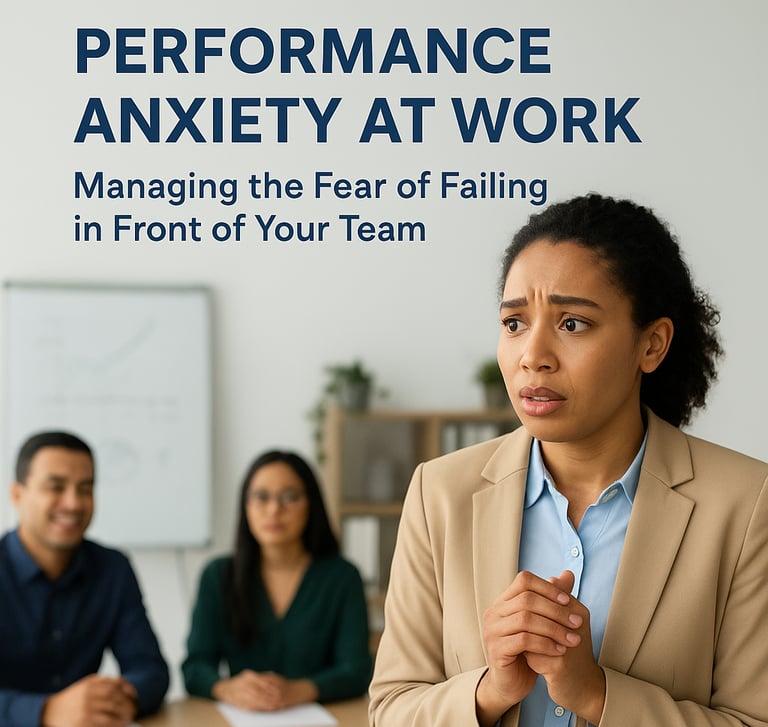Performance Anxiety at Work: Managing Fear of Failing in Front of Your Team
Feeling nervous before presentations, meetings, or high-stakes tasks at work? Performance anxiety is common, but it doesn’t have to hold you back. This blog explores practical strategies to manage fear, build confidence, and perform effectively in front of your team, without letting anxiety take over.
IMPORTANT CONVERSATIONS
E-Job Services
9/3/20252 min read


Many professionals know the feeling: your heart races, your mind spins, and suddenly a simple task feels like climbing a mountain. Performance anxiety at work, the fear of failing in front of your colleagues or superiors, is more common than you might think. Left unmanaged, it can affect your confidence, your relationships with your team, and even your long-term career growth.
Understanding Performance Anxiety
Performance anxiety goes beyond ordinary nerves. It is a persistent worry that your actions won’t meet expectations, often leading to:
Overthinking every task or interaction
Difficulty speaking up in meetings
Physical symptoms like sweating, shaking, or a racing heartbeat
Avoiding opportunities to showcase skills
This anxiety often stems from a combination of perfectionism, past negative experiences, high expectations, or the pressure to impress. Recognizing these triggers is the first step to managing them effectively.
Common Scenarios That Trigger Anxiety at Work
Presentations and Meetings: Speaking in front of your team can be daunting, especially if you fear judgment.
Project Deadlines: When stakes are high, anxiety about making mistakes can increase exponentially.
Performance Reviews: Anticipating critique or feedback often triggers worry and self-doubt.
New Roles or Responsibilities: Stepping into unfamiliar territory can create fear of failure.
Strategies to Manage Performance Anxiety
1. Prepare Thoroughly
Preparation is one of the most effective ways to reduce anxiety. Break down complex tasks, rehearse presentations, and anticipate possible questions. The more familiar you are with the material, the more confident you will feel.
2. Reframe Your Mindset
Shift your focus from fear of failure to contribution. Ask yourself: “How can I add value?” instead of “What if I mess up?” This positive reframing reduces self-imposed pressure and enhances performance.
3. Practice Breathing and Mindfulness Techniques
Stress and anxiety trigger physical responses. Controlled breathing—inhale for four counts, hold for four, exhale for four, pause for four—can calm your nervous system. Mindfulness exercises, such as briefly observing your thoughts without judgment, can help you regain focus.
4. Normalize Mistakes
Everyone makes errors, even experienced professionals. Mistakes are opportunities to learn and grow. Adopting this mindset reduces fear and promotes resilience.
5. Set Realistic Expectations
Perfectionism often fuels anxiety. Set achievable goals for yourself and understand that no one expects flawless performance. Celebrate progress rather than perfection.
6. Seek Support
Talking to a mentor, trusted colleague, or supervisor can help you gain perspective. Sharing concerns often reduces pressure and allows others to provide guidance and encouragement.
7. Practice Gradual Exposure
Start with smaller, lower-stakes tasks that challenge your comfort zone. Gradually increase responsibility and visibility. Over time, repeated success builds confidence and reduces anxiety.
8. Focus on Physical and Mental Wellbeing
Regular exercise, adequate sleep, and balanced nutrition can significantly affect your ability to cope with stress. Mental wellness practices, such as journaling or reflective meditation, also help manage workplace anxiety.
9. Celebrate Wins
Acknowledge accomplishments, both big and small. Recognizing your achievements builds confidence and reinforces the idea that you are capable and competent.
The Bigger Picture
Performance anxiety doesn’t have to define your work experience. By understanding your triggers, preparing well, reframing your mindset, and using healthy coping strategies, you can manage fear and perform confidently. Remember, even highly successful professionals experience anxiety, it’s your response to it that sets you apart.
